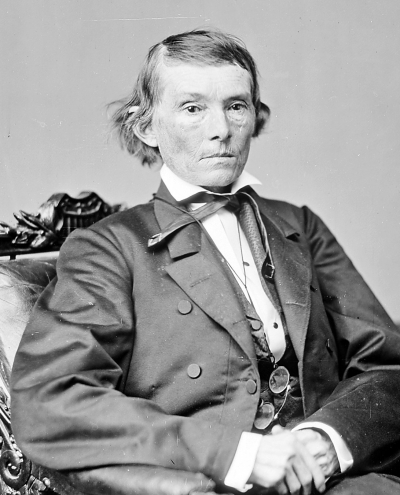The Cornerstone Speech, also known as the Cornerstone Address, was an oration given by Alexander H. Stephens, Vice President of the Confederate States of America, at the Athenaeum in Savannah, Georgia, on March 21, 1861. The speech, delivered extemporaneously a few weeks before the Civil War began with the Confederate attack on Fort Sumter, defended slavery as a fundamental and just result of the supposed inferiority of the black race, explained the fundamental differences between the constitutions of the Confederate States and that of the United States, enumerated contrasts between Union and Confederate ideologies, and laid out the Confederacy's rationale for seceding from the U.S.
In particular, he stated that "our new government['s] foundations are laid, its cornerstone rests, upon the great truth that the negro is not equal to the white man; that slaverysubordination to the superior raceis his natural and normal condition. This, our new government, is the first, in the history of the world, based upon this great physical, philosophical, and moral truth."
Alexander Hamilton Stephens (February 11, 1812 – March 4, 1883) was an American politician who served as the vice president of the Confederate States from 1861 to 1865, and later as the 50th governor of Georgia from 1882 until his death in 1883. A member of the Democratic Party, he represented the state of Georgia in the United States House of Representatives before and after the Civil War prior to becoming governor.
Stephens attended Franklin College and established a legal practice in his home town of Crawfordville, Georgia. After serving in both houses of the Georgia General Assembly, he won election to Congress, taking his seat in 1843. He became a leading Southern Whig and strongly opposed the Mexican–American War. After the war, Stephens was a prominent supporter of the Compromise of 1850 and helped draft the Georgia Platform, which opposed secession. A proponent of the expansion of slavery into the territories, Stephens also helped pass the Kansas–Nebraska Act. As the Whig Party collapsed in the 1850s, Stephens eventually joined the Democratic Party and worked with President James Buchanan to admit Kansas as a state under the pro-slavery Lecompton Constitution (which was overwhelmingly rejected by voters in a referendum in that state).
Stephens declined to seek re-election in 1858, but continued to publicly advocate against secession. After Georgia and other Southern states seceded and formed the Confederate States of America, Stephens was elected as the Confederate Vice President. Stephens's Cornerstone Speech of March 1861 defended slavery, though after the war he distanced himself from his earlier sentiments. In the course of the war, he became increasingly critical of President Jefferson Davis's policies, especially Confederate conscription and the suspension of habeas corpus. In February 1865, he was one of the commissioners who met with Abraham Lincoln at the abortive Hampton Roads Conference to discuss peace terms.
After the war, Stephens was imprisoned until October 1865. The following year, the Georgia legislature elected Stephens to the United States Senate, but the Senate declined to seat him due to his role in the Civil War. He won election to the House of Representatives in 1873 and held that office until 1882, when he resigned from Congress to become governor of Georgia. Stephens served as governor until his death in March 1883.

1861Mar, 21
Alexander Stephens gives the Cornerstone Speech.
Choose Another Date
Events on 1861
- 21Jan
Jefferson Davis
American Civil War: Jefferson Davis resigns from the United States Senate. - 18Feb
Jefferson Davis
In Montgomery, Alabama, Jefferson Davis is inaugurated as the provisional President of the Confederate States of America. - 20Apr
Robert E. Lee
American Civil War: Robert E. Lee resigns his commission in the United States Army in order to command the forces of the state of Virginia. - 8May
Richmond, Virginia
American Civil War: Richmond, Virginia is named the capital of the Confederate States of America. - 6Sep
Ulysses S. Grant
American Civil War: Forces under Union General Ulysses S. Grant bloodlessly capture Paducah, Kentucky, giving the Union control of the Tennessee River's mouth.

 English
English  español
español  français
français  português
português  русский
русский  العربية
العربية  简体中文
简体中文 